November - December 2016
Dear Friends,
The PiAf Office has been busy wrapping up the 2016 year! We are now in the process of reviewing 405 applications to search for members of the 2017-18 fellowship class in addition to moving into our new office in the Louis A. Simpson International Building. Our new address is Louis A. Simpson International Building, Princeton University, Princeton, NJ 08544. In addition, we would like to welcome former Fellow and new Program Manager, Michelle Spada, to the PiAf Team!
Michelle Spada grew up outside of Philadelphia and comes from a program management and community development background. She has a degree from Vanderbilt University in Human and Organizational Development with a concentration in International Leadership and Development. Michelle was a Princeton in Africa Fellow in 2012-2013 and worked with the International Rescue Committee in Liberia. After her fellowship, Michelle stayed in Liberia and helped start Liberia’s first tuition-free all-girls private school, More Than Me Academy. During the Ebola epidemic, Michelle led an Emergency Ebola Response Health Program in West Point, Liberia’s largest slum community. While living in Liberia, Michelle also launched a social enterprise, LibUsa, that continues to provide training and employment for youth. Michelle returned to the United States in 2015 and served as the Director of Family Services for Habitat for Humanity of Montgomery County, PA. Michelle sits on the Upper Perkiomen Domestic Violence Taskforce and mentors Girl Scouts implementing their Silver and Gold Award projects. As a Former Fellow, Michelle is honored to join the Princeton in Africa Team!
This edition of the Fellows Flyer includes Brian White, 2000-01 Fellow with International Rescue Committee in the Democratic Republic of Congo. Brian reflects on his fellowship year during a recent visit to the DRC.
We hope you enjoy reading about our 2016-17 Fellows! Enjoy the rest of 2016!
Warm regards,
Jodianna Ringel
Executive Director
P.S. Check out pictures from our 2016 Annual Gala!
PiAf Connections
Please click below to check out pictures of our Fellows, Alums and other members of the PiAf family meeting up at home and around Africa.
Notes from the Field
By Caitlin Allmaier, 2016-17 Fellow with Olam International in Tanzania
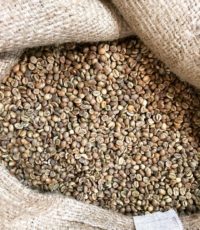
Caitlin often checks in with Olam field staff in Kagera region, who are in charge of buying dried coffee cherries that are processed into green coffee beans, pictured above.
Through my fellowship post, I have the pleasure of traveling to Kagera region, in northern Tanzania. One Fastjet plane, one tiny plane, and some bumpy roads transport me to the heart of Robusta coffee territory.
Olam sources from approximately 5,000 farmers in Karagwe and Kyerwa districts, and I have spent a considerable amount of time either on the ground or on the phone with our field staff. I have grown, quickly, into a management role on the project, which has given me plenty to reflect on as I near the six month mark in my fellowship.
I began my work in Kagera as monitoring and evaluation personnel, reviewing what our donor needed for our biannual report and trying to revamp the field staff’s capacity to organize how many coffee trees are on each of our 5,000 farmers’ farms in a reasonable amount of time. Hint: there is no reasonable amount of time for this exercise. We’re working as best we can! Through the relationships I developed with our staff on the ground, I was able to leverage a more involved role pretty quickly, taking over as the main liaison between our extension staff in the field and our business staff here in Dar es Salaam. Now, all requests pass from the field up through me. All decisions made in DSM pass back down to the field, through me. I have the power to amplify, to prioritize, to downgrade. It’s exciting, and terrifying.
While I recognize that I have a useful understanding of Excel, I also acknowledge that, past that, I don’t know anything in particular about managing staff – especially a team of 10 people! But that’s one of the reasons I sought out a Princeton in Africa fellowship – I wanted to push my boundaries, to learn from a variety of people, and to ultimately improve both my hard and soft skills.
When I make a decision regarding our coffee operations in Kagera, it’s always made in tandem with our field staff. I make an active effort to ask for advice, to actually listen to what the staff is saying, and to work as an additional amplifier for our field officers, and farmers, at our main office in Dar es Salaam. I know I am here mostly to learn, not yet to lead, and so I see my “management” role as more of a megaphone than its own position. This is exactly where I want to be.
Notes from the Field
By Meghan Bodo, 2016-17 Fellow with Village Enterprise in Uganda
“So, what do you do?”
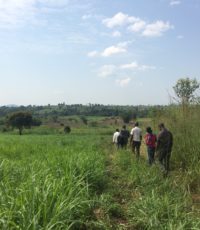
Meghan takes a picture during a field visit in Hoima, Uganda.
This is the question that I was most frequently asked before starting my fellowship year on the Monitoring + Evaluation team at Village Enterprise. It was also the question I dreaded the most. Despite having received a pretty thorough description of both my professional responsibilities and living situation, I had never before worked on a Monitoring + Evaluation team or lived in rural East Africa. The truth was, I didn’t have any concrete idea of what I would be doing.
It’s been three months since I started my Princeton in Africa fellowship year. I still enjoy a good amount of uncertainty and spontaneity as part of my everyday life, but now I also have the pleasure of being able to elaborate on some of the specifics.
So, what do I do?
Morning
Posho is a four-month-old bundle of puppy joy, whom my roommate Hannah and I have adopted. I normally start my day by taking her for a walk, with our destination normally being the nearby stand that sells watermelon-passionfruit juice. “Posho” is one of the most common forms of starch that accompanies meals in Eastern Africa; it is also called “ugali”. The food version is made from boiling water and millet or rice flour. Our staff found the choice of name for a dog quite hilarious, but ultimately accepted and even supported it.
Day
Much of my work takes place in the office, but the heart of all Village Enterprise work is in the field. About twice a month, I travel into the field to visit and speak with our program participants. This month, I experienced my first disbursement: after a few weeks of program-based community-building, saving, and business planning, program participants come together to receive grants from Village Enterprise that will serve as the seed capital for their businesses. The contribution from Village Enterprise, and the savings from the program participants themselves, are placed in the same envelope and given to the program participants to signify the collaboration and commitment of each party.
My specific role at Village Enterprise is the Monitoring + Evaluation Fellow. A critical task for monitoring and evaluation is to ensure that we are gathering high-quality data from our program participants. Data might not be the first word that comes to mind when one considers international development — but impact might be. Data is what allows us to measure and understand our impact; the two are critically connected. One way that I have directly participated in ensuring the quality of our data is through enumerator spot checks, in which our M+E staff accompanies an enumerator in the field while they are administering a survey to ensure accuracy and document areas for improvement.
Evening
Evenings have been reserved for socializing and getting to know the town. One highlight is Soroti Rock, the granite formation for which the town was named!
Notes from the Field
By Diego Gomez, 2016-17 Fellow with Clinton Health Access Initiative in Swaziland
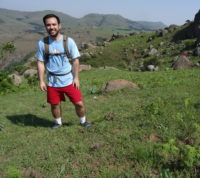
Diego climbing Sheba’s Breast for Brave the Breast, a charity hike to fight breast cancer in Swaziland.
The Princeton in Africa Fellowship offered an opportunity to work in and learn about a new sector and country: public health in Swaziland. After having spent seven years working in finance, I wanted to apply the analytical and technical skills I had acquired from financing the construction of energy and infrastructure projects to issues in the development sector. The opportunity to work for the Clinton Health Access Initiative (CHAI) and experience life in Swaziland has been challenging, educational, and rewarding, which is exactly what I wanted.
As a member of the Health Financing team, our team’s work revolves around supporting the Ministry of Health to drive transformative change by addressing three key pillars:
- understanding health resources and needs,
- improving management and utilization of existing resources
- securing and sustaining impact for long-term growth
This approach is designed to achieve the Health Financing team’s fundamental goal of removing financing as a real or perceived barrier to accessing quality care.
I’m part of the CHAI team working in collaboration with the Ministry of Health to assess the Swaziland health care system’s offering of essential health care services. For this project, CHAI’s goal is to support the MoH to improve their service delivery gaps by scaling up and strengthening services at health care facilities to achieve 80% coverage of Essential Health Care Package (EHCP) standards. In order to achieve this, we needed to survey the facilities to understand what the service delivery gaps were and why they existed.
The Health Financing team in collaboration with the Drug Access team, created an assessment survey that was administered to health care workers at eight clinics to identify potential service and resource gaps within the health care sector of Swaziland. My responsibility was to create an Excel tool to interpret the data collected from the survey in order to quantify the service delivery gaps. The tool has allowed both CHAI teams to pinpoint service and resource gaps in order to recommend facility improvements to the MoH. These were shared during a one-day workshop attended by the heads of the regions and clinics.
Outside of the office, life in Swaziland offers many exciting activities. I’ve joined a soccer team, which has offered me a different perspective of Swaziland through the lens of my Swazi teammates and visiting different areas of the country to play matches. I’ve also undertaken a few new challenges like teaching myself how to drive a manual car and playing chess Friday evenings with a Swazi national chess player.
The PiAf motto “Service for a Year. Commitment for a Lifetime” fits my experience working for CHAI. I have learned about a new sector and country, connected with interesting people from around the world, and pursued personal growth. This is not only setting the stage for a rewarding year but also an experience I’ll look back on positively for the rest of my life.
Notes from the Field
By Shaquilla Harrigan, 2016-17 Fellow with World Agroforestry Centre in Kenya
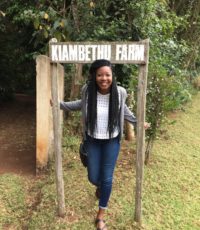
Shaquilla standing at the main entrance of Kiambethu Farm, one of the first commercial tea farms in Kenya. The farm was founded in 1910.
Mambo! I can’t believe I’ve been in Kenya for a little over two months now. While I’ve established a work routine and have started rudimentary adult-ing, Kenya still never ceases to surprise me. From being in awe of locals casually walking between speeding cars and bodas to witnessing Kenya’s beautiful and diverse landscapes, this country has so much to offer.
In fact, this country has offered me my first post-graduate job! I’m currently working at AWARD (African Women in Agricultural Research and Development) based in Nairobi. At AWARD, I’m on the communications team where I manage our social media, create branding materials, provide event support, and tell the stories of our fellows.
I’ve come to AWARD at a very exciting time because the organization is changing its programming to ensure that gender is mainstreamed across all aspects of the agricultural value chain. AWARD’s new initiatives now include the launch of an agribusiness incubator called GAIA (Gender in Agribusiness Investments for Africa) and working with agricultural research and development institutions to close the gender gap.
Taking on so many new projects and thinking about how to communicate them has been daunting and exciting, but I’ve learned so much in the last two months. I think one of the biggest lessons I’ve learned while on the job is how vital agriculture is to literally everyone on earth. In America, I definitely took for granted the process of researching, growing, producing, and selling food. Living in Kenya and seeing how it employs the majority of people has given me a greater appreciation for all the work and human interactions that go into agriculture.
In addition to taking on new tasks at work, I’m also being intentional about taking on new adventures to ensure I see more of Kenya and East Africa. A couple weeks ago, I visited Kate, a Kenya Fellow with the BOMA Project, in Nanyuki, about three hours north of Nairobi. While there, I got to see the majestic Mount Kenya (miraculously not shrouded in clouds) and went on a hike through Ngare Ndare park. Inside Ngare Ndare, there is a beautiful waterfall and natural lagoon that supplies water to locals. It was absolutely breathtaking. I hope to visit even more parks once my residency card is approved.
Overall, I’m having a great time in Kenya. In my short time here, I’m amazed by the innovative solutions that are based here and I hope they get their due recognition in Western media. I want my year in Kenya to change people’s, at minimum those within my network, negative generalizations about Africa.
My time in Kenya has also allowed me to reflect on my relationship with America, especially given this election and the many intersectional injustices happening, and get a sense of how the rest of the world views the US. While most Americans do view the US as the world’s super power, I don’t think many realize how tangible that is for people around the world.
The idea of a global citizenry is more important than ever, and I am so grateful to Kenya for welcoming me for the next year.
Notes from the Field
By Sylvana Lewin, 2016-17 Fellow with African Cashew Alliance in Ghana
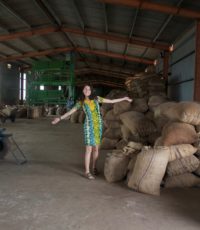
Sylvana at a cashew field visit.
In the past four months, I’ve had a lot of amazing experiences; and yet, now that the time has come to sit down and put to words what my Princeton in Africa experience means to me, how it’s changing me, and more simply just what my life in Ghana has been like, I’m at a complete loss for words. And I think that is the best way to describe what being on a Princeton in Africa fellowship in Ghana has been like for me: indescribable.
Last fall I sent in my application to Princeton in Africa positive it was a long shot. Then when I got called for an interview and saw prospective candidates as I was walking in, I decided it was really great I had gotten to this round, but clearly I wouldn’t be going any further. When I got called about interviewing with the African Cashew Alliance during my finals, I nearly had a heart attack. Finding out I had gotten the fellowship the day after my birthday and two days before graduating, I didn’t know what to do with myself. I still don’t know what to do with myself.
Being on a Princeton in Africa fellowship for the past four months has been incredible. Now, I’m not going to say there haven’t been tough moments because there definitely have been, but the overall experience has been truly special. In just four months, I’ve traveled to Gambia to help facilitate a workshop on market information systems and processing under a USAID WATIH grant, surfed on the coast of Ghana, visited cashew farmers and processors throughout Northern Ghana, traveled to Guinea Bissau for the 10th ACA World Cashew Festival & Expo (which I got to help plan and implement), and so much more! These opportunities are things I never would have been able to do without the fellowship. By connecting the other 48 fellows and I to our different organizations throughout the continent, PiAf provides us with the unique opportunity not only to live in Africa and work at higher levels, but also to truly experience a new kind of life.
Some might be tempted to see a Princeton in Africa fellowship as a box to check off on your resume, but it is so far from that. Not only does it provide young people with the important opportunity to work abroad in areas where entry-level jobs are lacking, but the fellowship also provides a time to learn about oneself, experience a new culture, and so much more. Throughout the next nine months, I’ll be asking myself important questions about the kinds of organizations I want to work for in the future, where I want to live, and the necessity of a law degree among others. It’s my job, the network I’m gaining, living in Ghana, and the fellowship that are helping me answer these questions. I’ll also be exploring new countries, surfing as often as possible, writing too many Africa puns in my blog, and trying to say yes to as many new experiences as possible. And I couldn’t be more nuts about it!
Notes from the Field
By Kevin Nigarua, 2016-17 Fellow with Maru-a-Pula in Botswana
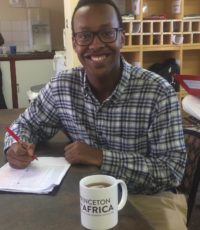
Kevin grading papers in Maru-a-Pula’s staffroom.
“Congratulations Class of 2016!”
The applause, sobs, and fanfare were still ringing in my ears as I landed in Gaborone, Botswana. As I entered my first lesson, I was obviously distracted – simultaneously trying to analyze every word and movement I was making at the front of the classroom while also attempting to comprehend how in less than 2 weeks I had managed to finish finals, pack for a year abroad, say goodbye to my friends and family, graduate, move to a new country, pick up a daunting history curriculum, and begin teaching said curriculum.
My introduction to Botswana was a dizzying series of milestones with few to no pauses in between.
In hindsight, I would do it all again in a heartbeat. Because I was so terrified of what was to come, so unsure of myself and my environment, I grew so much. Of course, I had help: Maru-a-Pula provided much encouragement and support as did my fellow Fellows. At the end of the day, however, I was very much in charge of my own adjustment and transition. That, more than anything, taught me more about how one’s attitude can make or break just about any situation.
After finally saying goodbye to the past 4 years of my life, I realized just how much of an immense privilege I had been given. I was thrust into a city and a country that prides itself on its warmth, friendship, and camaraderie. I was teaching material that I had either not seen in a long time or had never seen before, forcing me to learn, digest, process, and then creatively manipulate the information into lessons. I was discovering how to function as an adult, with no hand-holding but with plenty of support. In essence, I was given a chance to develop and grow. That’s the greatest thing that could ever happen to anyone.
Now, 4 months into my fellowship, I can see the growth that has occurred. Teaching, while far from my forte, is becoming easier and less intimidating by the day. I am also delving deeper into my relationships here while also solidifying my interests, skills, and values. I am much more willing to take risks and leaps, be it saying hello to complete strangers or proposing and taking charge of a major project with a significant probability of failure. All of this would have either happened later or not have happened at all had I not been destabilized as suddenly as I was when coming to Gaborone.
I have had phenomenal experiences already: Botswana’s 50th Anniversary, a road trip all around the country, and a successfully led service trip to Botswana’s only refugee camp. But, I know that I am far from finished growing and experiencing while here. So, here’s to the next major milestone. Full speed ahead!
Notes from the Field
By Staci Sutermaster, 2016-17 Fellow with Lwala Community Alliance in Kenya
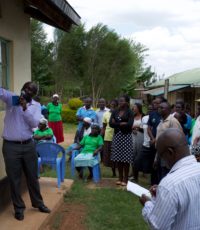
Teams presenting solutions at the Community Innovations Summit.
When I exited the plane in Kisumu, I felt a little nervous for the first time. What will my new home be like?
Fast-forward 4 months, and the North Kamagambo region now has my heart. I love the roosters that wake me up in the morning, the wind blowing in my face on pike (motorbike) rides to the field, and most of all – the people. I consider myself lucky to be surrounded by such a phenomenal team and community; I can feel their passion and commitment to bring the wholeness of life to Lwala and beyond.
As the Monitoring and Evaluation (M&E) Fellow, I mainly focus on evaluations to guide programmatic improvements. Most importantly, I communicate the analyses’ results in an effective, actionable manner so that teams can take the lead on improving programs. In the next few weeks, I look forward to completing the analysis of a small-scale, robust comparative study investigating the impact of eReaders in the classroom. I have also researched technology platforms to transition Lwala Community Alliance’s household survey to mobile form. I look forward to piloting the electronic version soon! This will help inform the M&E team’s development of solutions that improve the interoperability of our data systems.
With many different projects and responsibilities, everyday feels like a new adventure, and I love every moment! Of the many lessons learned so far, I feel most affected by Lwala Community Alliance’s commitment to the community. Community ownership is vital to develop sustainable, impact-focused interventions. The organization’s multidimensional approach is both community-driven and community-led, spanning clinical care, economic development, public health outreach, and education programs. The Lwala Community Alliance team actively engages community members in designing solutions, such as the 2020 strategy challenges posed during a recent Community Innovation Summit. Witnessing and contributing to this on the ground is truly inspirational.
In the coming months, I hope that time will slow down. I want to spend more time in the community, building the relationships that have really shaped my experience so far. I look forward to continued personal and professional development at Lwala Community Alliance!
Notes from the Field
Alumni Update: Brian White, 2000-01 Fellow with International Rescue Committee in Democratic Republic of Congo
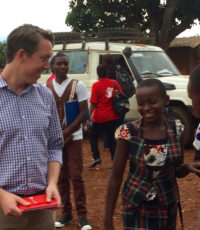
Brian visiting a youth club meeting in Bukavu during his 2015 visit
We take off from Goma, headed West, over the vast interior of the Democratic Republic of Congo. The first view is of Lake Kivu, then mountains followed by a wide expanse of jungle, and finally the great Congo River, as we touch down in Kinshasa two hours later. It’s November 2015, and although planes fly this route daily, the flight is still a minor milestone for me. When I last set foot in the DRC, the only way to travel from the Eastern Provinces to the capital in the West was through another country. That was fifteen years ago, when the Second Congo War, also known as the Great War of Africa, had divided the country in two.
In June 2000, I arrived in Bukavu, 60 miles South of Goma on the shores of Lake Kivu, to serve as a Princeton in Africa Fellow for the International Rescue Committee. I had braced myself for a refugee camp scene of human misery. What I found was a crumbling, colonial era resort town, with views that could fit in the pages of a travel magazine as easily as in a humanitarian report. For the next eighteen months, I wrote reports and proposals to support IRC’s health care, water, and other emergency assistance programs in the communities around Bukavu, where families displaced by the conflict had arrived in search of security and protection.
Although this period left a deep impression on me personally and shaped the arc of my professional career, I did not return to DRC until late 2015, when I got to visit Goma and Bukavu for Save the Children. Despite the years, many sights were familiar: vendors pushing carts across the bridge between Cyangugu and Bukavu; fisherman working with lamps at night on Lake Kivu; and rolling green hills. The eastern DRC’s striking beauty still yields a kind of dislocation from the human suffering and chaos that dominates the media coverage of the Congo, and it raises the hope that the future for the region could be starkly different than the present.
By 2015, peace accords had long since brought an end to large-scale armed conflict in the DRC, but localized conflicts continue to flare in the East. Insecurity and limited economic prospects have driven an even greater portion of the rural population to the cities, and Bukavu and Goma’s populations have doubled in the past decade and a half. Even for a region as rich in resources as the eastern DRC, this growth causes a strain on resources. These trends are not unique to the DRC, but the lack of meaningful governance in the East seems to have compromised a serious response to these challenges.
During my visit, much of the talk in the DRC was of elections that were scheduled to take place in November 2016. These elections have since been postponed, and with them, the opportunity for communities in the East to move further towards a lasting reconciliation and address the other long-term challenges that they face. In the meantime, the people of the East will likely do what they have done for the past two decades: put one foot in front of the other, move forward, and wait for their leaders to come around.






